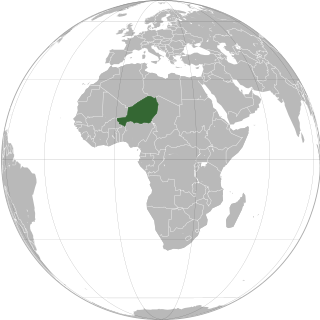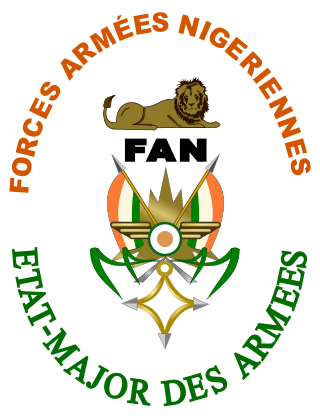
Niger, officially the Republic of the Niger, is a landlocked country in West Africa. It is a unitary state bordered by Libya to the northeast, Chad to the east, Nigeria to the south, Benin and Burkina Faso to the southwest, Mali to the west, and Algeria to the northwest. It covers a land area of almost 1,270,000 km2 (490,000 sq mi), making it the largest landlocked country in West Africa and the second largest landlocked nation in Africa behind Chad. Over 80% of its land area lies in the Sahara. Its predominantly Muslim population of about 25 million lives mostly in clusters in the south and west of the country. The capital Niamey is located in Niger's southwest corner along the namesake Niger River.
Humans have inhabited present-day Niger since prehistoric times, with evidence of early activity dating back 60,000 years. The region hosted ancient rock carvings and pastoral communities from 7,000 BCE. Once fertile, it supported large settlements and cattle herding until the climate became arid around 2500 BCE.

The gross domestic product (GDP) of Niger was $16.617 billion US dollars in 2023, according to official data from the World Bank. This data is based largely on internal markets, subsistence agriculture, and the export of raw commodities: foodstuffs to neighbors and raw minerals to world markets. Niger, a landlocked West African nation that straddles the Sahel, has consistently been ranked on the bottom of the Human Development Index, at 0.394 as of 2019. It has a very low per capita income, and ranks among the least developed and most heavily indebted countries in the world, despite having large raw commodities and a relatively stable government and society not currently affected by civil war or terrorism. Economic activity centers on subsistence agriculture, animal husbandry, re-export trade, and export of uranium.

The Niger Armed Forces includes military armed force service branches, paramilitary services branches and the National Police of Niger. The Army, Air Force and the National Gendarmerie are under the Ministry of Defense whereas the National Guard and the National Police fall under the command of the Ministry of Interior. With the exception of the National Police, all military and paramilitary forces are trained in military fashion. The President of Niger is the supreme commander of the entire armed forces. The National Assembly of Niger passed a statute for the Army of Niger in November 2020, planning for the army's size to increase from 25,000 personnel in 2020, to 50,000 in 2025 and finally 100,000 in 2030.

The Economic Community of West African States is a regional political and economic union of fifteen countries of West Africa. Collectively, the countries comprise an area of 5,114,162 km2 (1,974,589 sq mi) and have an estimated population of over 424.34 million.

Niamey is the capital and largest city of Niger. Niamey lies on the Niger River, primarily situated on the east bank. Niamey's population was counted as 1,026,848 as of the 2012 census. As of 2017, population projections show the capital district growing at a slower rate than the country as a whole, which has the world's highest fertility rate. The city is located in a pearl millet growing region, while manufacturing industries include bricks, ceramic goods, cement, and weaving.

Agadez, formerly spelled Agadès, is the fifth largest city in Niger, with a population of 110,497 based on the 2012 census. The capital of the eponymous Agadez Region, the city lies in the Sahara desert, and is also the capital of Aïr, one of the traditional Tuareg–Berber federations. The historic centre of the town has been designated a World Heritage Site by UNESCO.
The Niger national football team represents Niger in international football through the Nigerien Football Federation, a member of Confederation of African Football (CAF). Niger plays in the colors of the flag of Niger, white, green and orange. Their nickname comes from the Dama gazelle, native to Niger, the Hausa name of which is Meyna or Ménas The Dama appears on their badge in the colors of the national flag.

Niger is a state in the North Central region of Nigeria. It is the largest state in the country by area. The state capital is Minna. Other major cities are Bida, Kontagora and Suleja. Niger state was formed in 1976 when the then North-Western State was divided into Niger State and Sokoto State. It is home state of two former Nigerian military heads of state — Ibrahim Babangida and Abdulsalami Abubakar. The Nupe, Gbagyi, Kamuku, Kambari, and Hausa form the majority of numerous indigenous tribes of Niger State. Other tribes in the state are Adara, Koro Gungawa, and Hun-Saare.

Maradi is the second largest city in Niger and the administrative centre of Maradi Region. It is also the seat of the Maradi Department and an Urban Commune.

Petroleum extraction in the Niger Delta has led to many environmental issues. The delta covers 20,000 km2 (7,700 sq mi) within wetlands, formed primarily by sediment deposition. Home to 20 million people and 40 different ethnic groups, this floodplain makes up 7.5% of Nigeria's total land mass, and is Africa's largest wetland. The Delta's environment can be broken down into four ecological zones: coastal barrier islands, mangrove swamp forests, freshwater swamps, and lowland rainforests. Fishing and farming are the main sources of livelihoods for majority of her residents.

Mohamed Bazoum is a Nigerien politician who served as the 10th president of Niger from 2021 to 2023. He assumed office in April 2021 after winning the 2020–21 presidential election and surviving a coup d'état attempt. He was ousted in the 2023 Nigerien coup d'état by members of the presidential guard and the armed forces led by Abdourahamane Tchiani.

The Tongo Tongo ambush or the Niger ambush occurred on 4 October 2017, when armed militants from the Islamic State in the Greater Sahara (ISGS) attacked Nigerien and US soldiers outside the village of Tongo Tongo, Niger, while they were returning to base after a stop in the village. During the ambush, four Nigeriens, four US soldiers, and at least 21 ISGS militants were killed, and eight Nigeriens and two US soldiers including the team commander were wounded. In the day preceding the ambush, the Nigerien and US soldiers conducted a mission attempting to locate and capture or kill Doundou Chefou, a commander in the ISGS.
David Umaru is a Nigerian Politician, and was the Senator representing Niger East Senatorial District of Niger State at the Nigerian 7th National Assembly and 8th National Assembly.
The COVID-19 pandemic in Niger is part of the ongoing worldwide pandemic of coronavirus disease 2019 caused by severe acute respiratory syndrome coronavirus 2. The virus was confirmed to have reached Niger in March 2020. Amnesty International reported that journalists have been arrested over reporting about the pandemic.
The Anglican Province of the Niger is one of the 14 ecclesiastical provinces of the Church of Nigeria. It comprises 9 dioceses:

Since 2015, the border area between Burkina Faso, Mali, and Niger has been a hotbed for jihadist forces originating from Mali. The insurgency has taken place in two distinct regions of Niger. In southwest, the Islamic State in the Greater Sahara and the Nusrat al-Islam have carried out attacks in the tri-border area with Burkina Faso and Mali. Meanwhile, in the southeast, the Islamic State in the West African Province has established control in parts of southern Niger.

An Islamist insurgency has been ongoing in the Sahel region of West Africa since the 2011 Arab Spring. In particular, the intensive conflict in the three countries of Mali, Niger and Burkina Faso has been referred to as the Sahel War.













